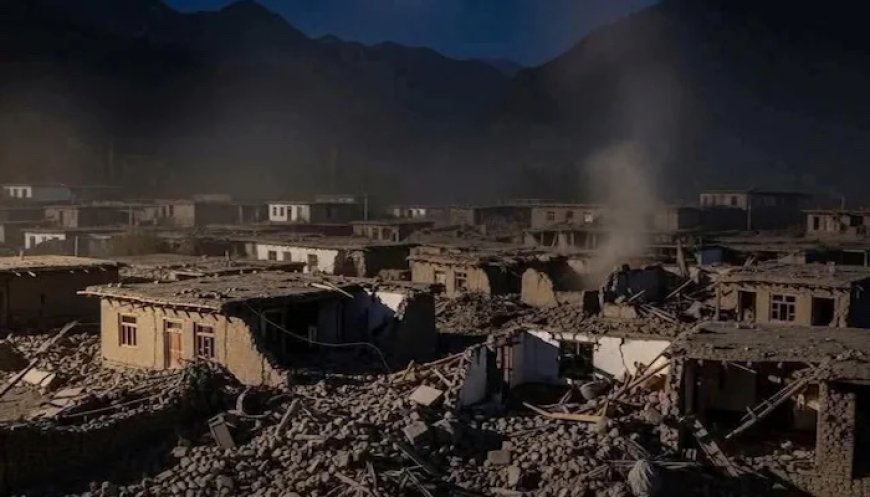Hundreds Killed as Powerful Earthquake Strikes From Afghanistan
A 6.8-magnitude earthquake originating in Afghanistan has killed hundreds and injured thousands. Tremors shook Pakistan, India, and Iran. Learn about the damage, rescue efforts, and international response.

A powerful earthquake originating in Afghanistan has left hundreds dead and thousands injured across the region, with tremors felt in Pakistan, India, and parts of Iran. According to initial reports from the US Geological Survey (USGS), the earthquake measured 6.8 on the Richter scale and struck at a depth of 30 kilometers near the Hindu Kush region late Tuesday night.
Earthquake Details:
-
Magnitude: 6.8 on the Richter scale
-
Epicenter: Hindu Kush region, Afghanistan
-
Casualties: Over 400 confirmed dead (toll expected to rise)
-
Injured: More than 2,000 reported so far
-
Countries Affected: Afghanistan, Pakistan, India, Iran, Tajikistan
-
Aftershocks: Multiple tremors between 5.2–5.7 magnitude recorded overnight
Epicenter and Affected Regions
The Hindu Kush region, located at the crossroads of Afghanistan, Pakistan, and Tajikistan, is highly prone to seismic activity due to tectonic plate collisions. The Afghanistan Earthquake 2025 has caused widespread devastation, particularly in remote areas that are difficult to access. Pakistan earthquake today was felt across major cities, with significant damage in the northern and western regions.
Worst-Hit Areas in Afghanistan:
-
Kunar, Badakhshan, and Nuristan provinces have suffered the most severe damage.
-
Dozens of villages have been flattened, with roads blocked due to landslides and collapsed infrastructure.
-
Communications remain disrupted in many mountainous and rural areas, further complicating rescue efforts.
Impact in Pakistan:
-
Tremors were strongly felt in Peshawar, Islamabad, Lahore, Swat, and Rawalpindi.
-
At least 120 deaths have been reported in Khyber Pakhtunkhwa (KP) and Gilgit-Baltistan.
-
Emergency services were deployed as buildings collapsed in several regions, particularly in KP and the northern areas. The NDMA Pakistan earthquake response is in full motion to coordinate rescue efforts.
Tremors in India:
-
Northern India, including Delhi, Punjab, and Kashmir, experienced mild to moderate tremors.
-
Authorities have reported no major damage so far but remain on high alert, monitoring aftershocks.
Relief and Rescue Operations
In Afghanistan:
-
The Afghan Red Crescent Society and UN humanitarian agencies have mobilized to lead the rescue efforts.
-
Helicopters have been deployed to reach isolated mountain villages.
-
Makeshift shelters have been set up for displaced families, but the lack of basic resources is a growing concern.
In Pakistan:
-
Rescue 1122, the Pakistan Army, and NDMA have been actively evacuating victims and providing emergency relief.
-
Relief camps have been established in Swat, Chitral, and Dir.
-
Medical teams and mobile hospitals have been dispatched to the hardest-hit zones, but medical supplies are running low. Pakistan earthquake rescue operations are ongoing, with a focus on affected areas like KP.
Medical and Humanitarian Crisis
Hospitals in Kabul, Jalalabad, Peshawar, and Islamabad are overwhelmed by the influx of injured people. Health workers report shortages of critical supplies such as blood units, oxygen cylinders, and trauma kits. In response to the growing crisis, international organizations are stepping in.
-
UNICEF has already dispatched emergency relief supplies to the region.
-
The World Health Organization (WHO) is coordinating medical support and ensuring that health needs are met in the affected regions.
-
Countries including Turkey, the UAE, and China have pledged financial aid and rescue equipment to support the ongoing relief efforts, as the international earthquake aid continues to pour in.
Public Safety Advisories
Authorities in Afghanistan, Pakistan, and India have issued public safety advisories to the public:
-
Stay outdoors during aftershocks to avoid the risk of falling debris.
-
Avoid damaged buildings and unstable structures.
-
Keep emergency kits ready and stay informed through official radio and SMS alerts.
Statement from Authorities:
“This is one of the deadliest earthquakes the region has faced in recent years,” said Ahmad Zia, spokesperson for the Afghan Ministry of Disaster Management. “Our priority is to rescue trapped survivors and provide emergency aid to affected families.”
Pakistan’s National Disaster Management Authority (NDMA) also urged citizens to stay cautious and follow official guidance: “We are closely monitoring aftershocks and ensuring immediate medical assistance to victims.”
The powerful earthquake has deeply shaken the region, leaving a trail of devastation and grief in its wake. While the rescue operations are in full swing, the challenges posed by rough terrain and ongoing aftershocks have made it difficult to reach all affected areas. As the full scale of the disaster continues to unfold, governments and international organizations are working together to provide urgent assistance, shelter, and medical care to those in need.

 Ateeq Ur Rehman
Ateeq Ur Rehman